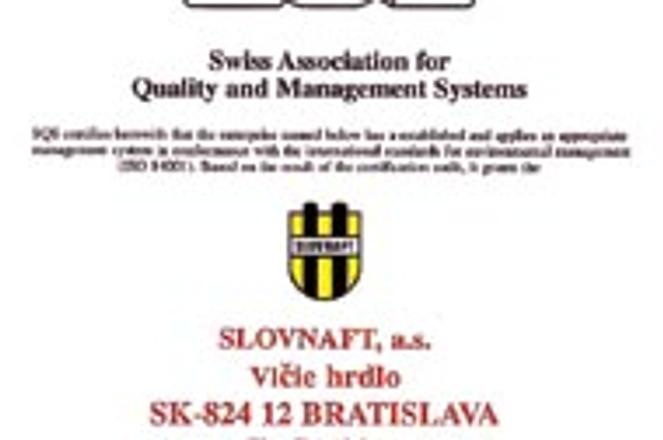Environmental improvement, not excellence.
At a press conference on September 8, 1997, petrochemical giant Slovnaft a.s. Bratislava announced that it had recently been awarded a prestigious international certificate, the ISO 14001, in recognition of its environmental management program.
But before the love-in starts, say some environmental groups, people should be aware that the certificate may help chemical firms like Slovnaft 'greenwash' their image rather than eliminate polluting practices. The ISO 14001, they point out, certifies a company's environmental management system, and does not guarantee any specific emissions targets.
Cestmir Hrdinka, Coordinator of Greenpeace's Toxic Campaign in the Czech Republic, suggested that Slovnaft's certification was not evidence of a superior environmental management system (EMS) but of a desire to improve its image as an exporter.
"There is not such a boom in Western Europe for these ISO certificates as in the Czech and Slovak Republics," he said: "Eastern European companies are using them to try an fix their old communist image as polluting nightmares."
"The ISO 14001 is in reality a very low-utility certificate ," said Hrdinka. "It deals only with management, and in the Czech Republic we have some companies who are big polluters advertising themselves with the ISO."
Although the most recent figures are difficult to come by in Slovakia, the Ministry of the Environment's statistics for 1995 show Slovnaft as the seventh biggest air polluter in the country. Given that Slovnaft's own forecast predicts an increase in atmospheric emissions between 1996 and 1998, it would appear that the ISO 14001 does not guarantee clean practices in Slovakia either.
Still, the certificate is more than just a rubber stamp.
"The ISO 14001 certification is voluntary, not obligatory," explained Juraj Lalík, Environmental Protection Manager at Slovnaft. "If you feel strong and well-prepared, you can apply to the International Standards Organization to be certified," he said.
Certification is decided after an audit, which can last up to a year: the company has to demonstrate that it is complying with national environmental laws, and that it has a program in place for future improvement. "It is not enough just to say these things - you have to show they are true, to guarantee them with facts," said Lalík.
Dr. Erich Wunderlich, the Lead Auditor at the Swiss Association for Quality and Management Systems (SQS), supervised the audit of Slovnaft's environmental management program. The ISO 14001 certificate, he agreed, meant that Slovnaft "is committed to reduce environmental pollution," to comply with Slovak environmental legislation and to "adequately communicate" with the public.
But the ISO 14001, it must be noted, affirms only that companies have "an appropriate management system" in place, not that the firm is meeting one or another set of pollution targets. In other words, there is a danger that what a factory does in practice differs substantially from what it claims to do on paper.
"ISO certification means that the company has to be open, to be communicating with the public, to be proving and showing its results," said Lalík. But Ľubica Trubinová, Director of Greenpeace Slovakia, argues that Slovnaft does not share information as effectively in practice as in theory.
"We participated once in a public discussion in July, 1997, regarding Slovnaft's planned construction of an incinerator for industrial waste," Trubinová remembered. "The discussion was really very poor, because we were given the material only three days before the meeting, and there was no time to prepare for it."
The ISO 14001 "is a bit of a paper tiger," in Trubinová's view. "Slovnaft has always had enough money for its public image." And while the certificate may guarantee disclosure of current emissions levels, the past is still largely hidden. "We still don't have enough information on how they solved the problem of pollution from former times," she said.
Lalík insisted that the SQS audit put Slovnaft in the highest echelon of enviro-friendly companies. "Certification is not a simple process, but Slovnaft has a big advantage in that we have been preparing our EMS for over 15 years," he said. "No western refinery has this certificate."
It cannot be denied that Slovnaft has made big reductions in both air and water pollution (see chart this page). Indeed, ISO certified companies are required to "comply with the environmental legislations of Slovakia" and, after 1999, with much stricter standards decreed by the European Union.
But according to Dr. Yvonne Hollá, spokesperson for Slovakia's Environment Ministry, the country's national environmental legislation gives big polluters in Slovakia two choices - to invest in new technology to reduce emissions to legal levels, or pay fines on a per-kilogram basis for emissions that exceed allowances. "Our environmental policy is based on the philosophy that the polluter must pay," she said.
This, in a nutshell, is what worries Greenpeace - that certificates like the ISO 14001 give companies the appearance of environmental responsibility while allowing them to continue to pollute heavily. The ISO guarantee, they say, does not rest on any concrete pillars but depends on abstract formulations like "improvement" and "reduction".
SQS auditor Paolo Morelli confirmed that companies with ISO 14001 are permitted to exceed national pollution levels "but only for a limited time, while they are preparing their new technology. This is the same as in America." Wunderlich, for his part, insisted that the worries expressed by Greenpeace are taken seriously at SQS.
"We are not in the business of requiring the least possible, and then looking away if something happens," Morelli said.



